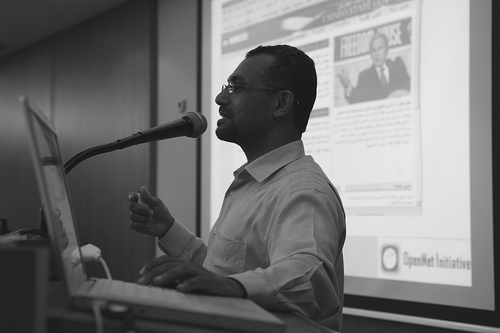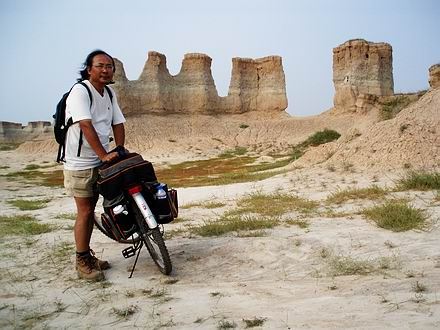The first day of the Global Voices Summit focused heavily on censorship and its effects on bloggers. Session three examined what bloggers and other netizens who live in countries with government censorship do to evade and combat it. The session was liveblogged [1] by Jillian York.
Awab Alvi [2], co-founder of the Don't Block the Blog [3] campaign in Pakistan, moderated the session. Speaking were:
- CJ Hinke [4], founder of Freedom Against Censorship Thailand (FACT) [5]
- Helmi Noman [6], a researcher who studies internet censorship and usage in the Arab world
- John Kennedy [7], a Canadian blogger living in China
- Rezwan [8], a Bangladeshi blogger who heads translation efforts for Global Voices Lingua in Bangla [9]
- Andrew Heavens [10], a journalist who has spent time in Ethiopia and Sudan
- Yazan Badran [11], Global Voices Lingua in Arabic [12] editor, filling in for Razan Ghazzawi [13] of the Free Tariq [14] campaign in Syria, whose flight was delayed
Thailand
CJ Hinke opened the session with a brief overview of Internet censorship in Thailand. The first censorship law was passed in 1997. The law was intended to assist in the fight against the trafficking of women and children, but its terms were strict enough to open the door for more widespread filtering. In 2006, a new cybercrime law was passed that included the death penalty, a sentence later reduced to 20 years in prison.
Fifty thousand web sites are currently blocked in Thailand, CJ said. He questioned whether the number of sites matters and suggested that the principle is more important. Freedom Against Censorship Thailand [5] (FACT) is anti-all censorship, and they have struggled to find supporters because many people believe that sites that distribute child pornography, objectify women or promote hate speech should be blocked.
Read more: OpenNet Initiative: Thailand [15], Global Voices Advocacy: Thailand [16]
Middle East and North Africa
Helmi Noman followed CJ's presentation by talking about the power shift that is currently taking place in the Middle East and North Africa (MENA). As more and more people have access to the Internet, the power to regulate social, economic and political activity is shifting from authorities to individuals. Governments are responding by cracking down on Internet use.
Censorship in the MENA region takes several forms, Helmi said. Some sites are blocked or filtered. Download speeds in some countries are controlled, effectively blocking access to movies and music. Finally, Internet cafés are often subject to strict regulations about screen placement and partitioning, ensuring that users’ screens are visible to employees at all times.
 [17]
[17]
Helmi Noman discusses Internet censorship in the Middle East and North Africa during the 2008 Global Voices Summit. Photo via madmonk [18].
Helmi noted that another obstacle to unfettered Internet use in the MENA area is social. Multiple studies and news articles have been released that focus on the negative effects, particularly the negative sexual consequences, of Internet on society. For example, one article claimed that many modern divorces are due to the amount of time men spend online looking at pornography.
There is some good news coming out of the region: multiple web sites now give tutorials on circumvention so users can access them after they are blocked. Yahoo! and other online groups are being used to exchange censored content, and a recent survey revealed that most Internet users in the region have used circumvention tools, especially proxy URLs, to access blocked sites.
Helmi ended his presentation by claiming that while filtering and censorship are problems in the MENA region, an even bigger issue is the digital divide. The gap between the actual and potential use of technology in the region is still large. Many people still lack Internet access, and those who do are clustered in urban areas.
Read more: OpenNet Initiative: MENA [19]
China
John Kennedy used his presentation to inject hope and encouragement into the middle of an otherwise sober panel, focusing on several positive things happening online in China.
Among his examples was a mashup of air pollution in China [20] [Zh], which is based on public records of pollution incidents and allows viewers to give feedback. Global Voices covered blogger reactions to the site [21] last December.
Another creative success story was that of Zhang Shihe [22] [Zh], a Chinese blogger who spent August 2007 bicycling through rural north central China [23] to bring seldom-published stories from the area to the blogosphere via photo, video and written posts. Zhang began blogging out of frustration at the failure of Beijing police to properly document a murder crime scene, and continues to write about crime, the 2008 Olympics, and a variety of other topics.

Chinese blogger Zhang Shihe on his month-long bicycle blogging tour through north central China. Photo via 24 Hours Online [24].
One of the most radical instances of blog activism in China took place after the house arrest and later imprisonment of environmental and political activist Hu Jia [25]. While Hu was in jail, his wife Zeng Jinyan [26], who was documenting Hu's detainment on her blog, was put under house arrest with the couple's newborn child in the Freedom City housing complex in Beijing.
Hu and Zeng recorded the conditions of their surveillance in a documentary called “Prisoners in Freedom City,” which was published on YouTube [27].
The conditions of the house arrest were so severe as to endanger the health of Zeng and the child, and Chinese bloggers and activists rallied to deliver baby formula and other supplies. After several failed attempts [28], one blogger succeeded, using the couple's documentary, Google Maps and blueprints of the building to hack past the surveillance system [29] and deliver milk powder to Zeng. The entire process, including directions, security police license plate numbers, photos of the complex and a detailed description of the 24-hour mission, was compiled in a manual that quickly spread through the Chinese blogosphere.
Read more: OpenNet Initiative: China [30], Global Voices Advocacy: China [31]
Bangladesh
In Bangladesh, Internet censorship is tied to the state of emergency instituted in January 2007, following riots and violence [32] surrounding scheduled parliamentary elections. All criticism of the government is banned, and the press self-censors heavily, Rezwan reported. News of extrajudicial killings and detentions is rarely if ever published by the mainstream media, and several journalists have been arrested.
Bangla bloggers are fighting back, however, and a large citizen journalism community is publishing investigative reports online. Bloggers are so active, Rezwan said, that they were able to spread the news of the arrest of Tasneem Khalil [33], a former journalist and blogger, so efficiently that the government was forced to release him after one day. Rezwan pointed out that Global Voices broke the story [34] to the international press and contributed to Khalil's release.
Read more: Global Voices Advocacy: Bangladesh [35]
Ethiopia
Andrew Heavens spoke of his experiences in Ethiopia, where the only internet service provider is state-run, text messaging has been blocked since May 2005 and a blanket block on the entire Blogspot domain is in effect. “Censorship is not just the basic fact of having your voice silenced,” Andrew said, calling it a personal attack that is meant to limit and demoralize the person being censored, leading eventually to self-censorship.
 [36]Andrew sketched an outline of internet censorship in Ethiopia, which from 2004 to 2005 had a vibrant blogosphere. Protested elections in June 2005 led to mass arrests and police massacres [37], and the blogosphere exploded in anger. By May 2006, all Blogspot blogs were blocked. Initially, the block motivated bloggers. Many displayed “Blocked in Ethiopia” badges on their sites, and information on proxy servers and other methods of circumvention were shared between bloggers.
[36]Andrew sketched an outline of internet censorship in Ethiopia, which from 2004 to 2005 had a vibrant blogosphere. Protested elections in June 2005 led to mass arrests and police massacres [37], and the blogosphere exploded in anger. By May 2006, all Blogspot blogs were blocked. Initially, the block motivated bloggers. Many displayed “Blocked in Ethiopia” badges on their sites, and information on proxy servers and other methods of circumvention were shared between bloggers.
Within a few months, however, several formerly active bloggers had stopped writing, others had slowed, and the flow of new blogs had dried up. Andrew blamed this on the block and lamented the self-censorship the Ethiopian government's actions have created. Even more aggravating, he said, is the fact that the government refuses to acknowledge the blocking, calling it a technical glitch.
Read more: OpenNet Initiative: Ethiopia [38], Global Voices Advocacy: Ethiopia [39]
Syria
The focus of Yazan Badran's presentation was Tariq Biaisi [40] [Ar], a Syrian blogger who was arrested for criticizing the Syrian security apparatus in an online forum, and detained for three years after being convicted of “weakening the national ethos.” The government reacted so strongly to the case that Razan Ghawazzi, originally schedule to give this presentation, closed her blog and moved to Lebanon. Bloggers and activists campaigned for Biaisi's freedom via the Free Tariq [41] movement, but the campaign was unsuccessful.
Yazan credited the campaign's failure to its inability to engage average Syrian citizens. The concepts of activism, volunteerism and freedom of speech the campaign was based on were not well-defined and have little meaning in Syrian society, he said. The bloggers working on the campaign were mostly living abroad, which lent an elitist feel to the movement.
Social and economic concerns also contributed to the general apathy surrounding Biaisi's case, Yazan said. As an Islamist, Biaisi was not supported by a portion of the population. Many people wondered why they should support free speech when they were struggling to feed their families. Yazan concluded by conveying a comment from Razan, who believes that economic reform is the best way to strengthen support for free speech in Syria.
Read more: OpenNet Initiative: Syria [43], Global Voices Advocacy: Syria [44]
